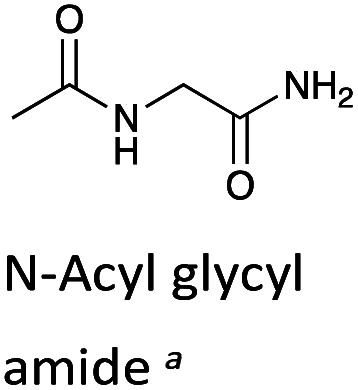Values for kDO, kHO, and pKas of the DKPs studied at 25 °C and I = 1.0 M (KCl).
| k DO (M−1 s−1) | k HO b (M−1 s−1) | k rel c | pKad | |
|---|---|---|---|---|
| c(Gly–Gly) | 6.33 × 10−2 | 3.17 × 10−2 | 12.2 | 20.9 |
| c(l-Ala–l-Ala) | 7.80 × 10−3 | 3.90 × 10−3 | 3.00 | 22.7 |
| c(Gly–l-Pro) | 1.87 × 10−1 | 9.35 × 10−2 | 144 | 18.8 |
| c(H2-Gly–l-Pro) | 2.09 × 10−2 | 1.05 × 10−2 | 16.2 | 21.2 |
| c(H3-Gly–l-Pro) | 6.59 × 10−2 | 3.30 × 10−2 | 50.8 | 19.9 |
| c(d-Ala–l-Pro) | 9.45 × 10−2 | 4.73 × 10−2 | 72.8 | 19.6 |
| c(d-Ala–l-Pro) | 5.51 × 10−3 | 2.76 × 10−3 | 4.25 | 22.6 |
| c(d-Pro–l-Pro) | 9.69 × 10−2 | 4.85 × 10−2 | 37.3 | 20.0 |
| c(d-Pro–d-Pro) | 8.62 × 10−3 | 4.31 × 10−3 | 3.30 | 22.6 |
| c(l-Pro–l-Tyr) | 1.19 × 10−1 | 5.95 × 10−2 | 91.5 | 19.3 |
| c(l-Pro–l-Tyr) | 2.09 × 10−3 | 1.05 × 10−3 | 1.60 | 23.7 |

|
2.6 × 10−3 | 1.3 × 10−3 | 1.00 | 23.9 |
H/D-exchange kinetic data for N-acyl glycyl amide, a linear analogue of a DKP, is included for comparison.48
Calculated from experimental kDO values using a secondary solvent isotope effect kDO/kHO = 2.00 (see text).
k rel = relative rate constants for deprotonation compared to value for linear N-acyl glycyl amide as reference. The krel values have been statistically corrected for the number of exchangeable protons.
Interpolated values from a Brønsted analysis (see text).
